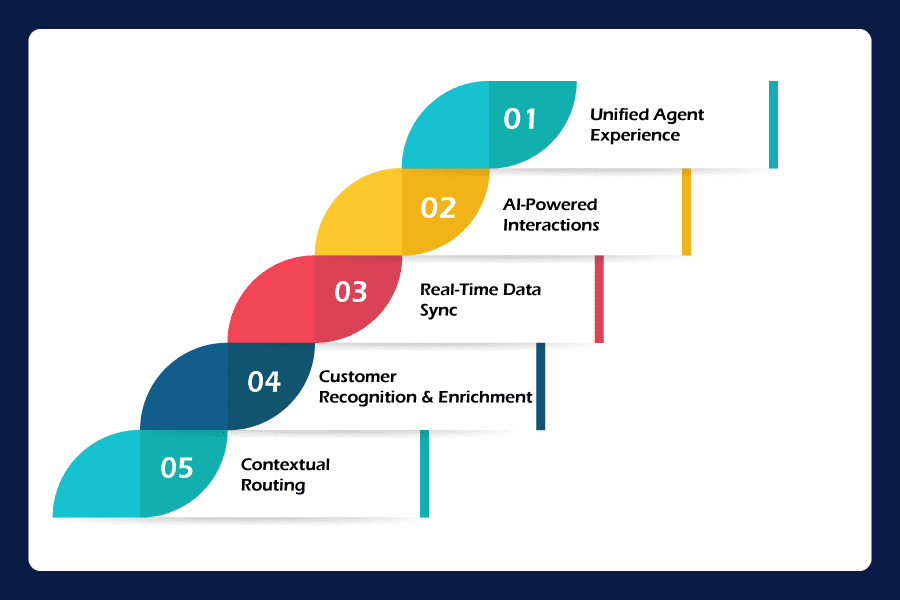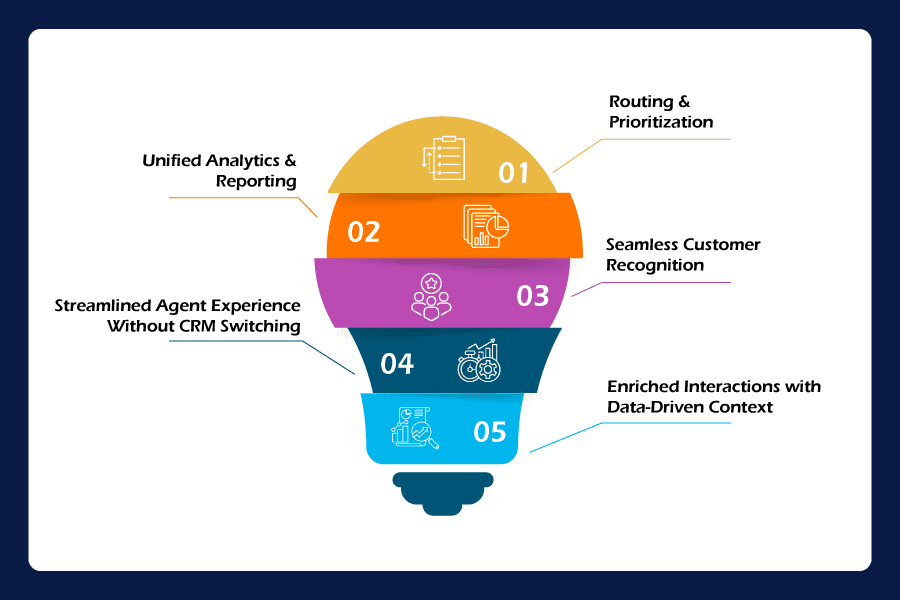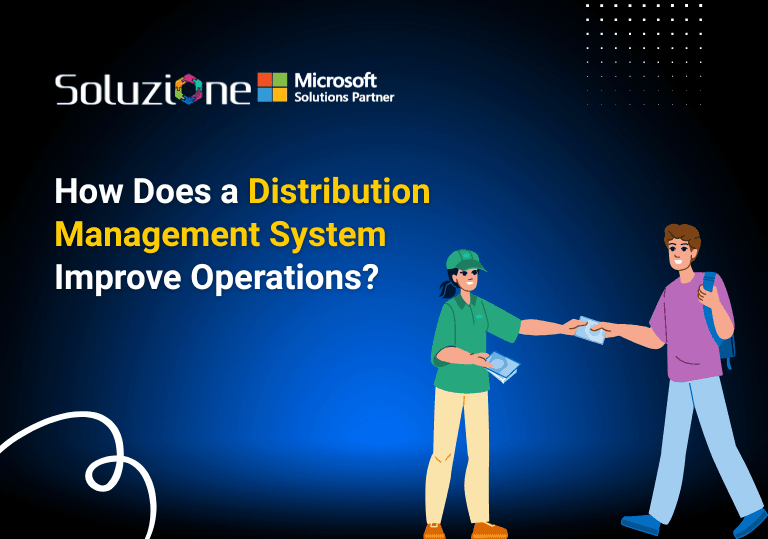
Microsoft Dynamics 365 CRM is fast becoming the backbone of modern contact center systems—especially with the launch of Dynamics 365 Contact Center in 2024. Built to unify communication channels with AI automation, and contextual insights.
However, many organizations continue to rely on Salesforce CRM for its advanced analytics and reporting capabilities. In fact, it has become increasingly common for businesses to operate in a hybrid CRM environment, where both Dynamics 365 and Salesforce coexist across departments. This is where the connector for Salesforce in Dynamics 365 Contact Center becomes a game-changing move.
This connector enables the direct integration of Salesforce data into Microsoft’s AI-powered contact center experience – unifying service operations across CRM platforms. In this blog, we will explore what the Salesforce connector in Dynamics 365 Contact Center is and why it deserves attention.
What is Microsoft Dynamics 365 Contact Center?
Dynamics 365 Contact Center is Microsoft’s standalone Contact Center as a Service (CCaaS) solution, launched in June 2024 to modernize customer engagement (CE). Unlike traditional contact center systems, Dynamics 365 Contact Center features are built natively on the Microsoft Cloud. It is the first fully AI-powered contact center solution from Microsoft, bringing Copilot for Service directly into the agent experience—across voice, chat, SMS, and digital channels.
But perhaps its most strategic edge is flexibility. With over 1,200+ prebuilt connectors, it works even if your CRM system isn’t Microsoft-based. That includes Salesforce, custom CRM, and other business apps—making it a strong option for hybrid environments.
About the Connector for Salesforce in Dynamics 365 Contact Center

The Salesforce connector allows businesses to integrate their Salesforce data into the Microsoft Dynamics 365 Contact Center experience—without building complex custom APIs. With a one-time access setup, teams can access real-time customer data from Salesforce inside the contact center UI, bringing everything into a unified agent experience.
Key Capabilities of Salesforce Connector in D365 CC
- Unified Agent Experience: Brings Salesforce records into the Dynamics 365 Contact Center UI so agents can access customer details, case history, and sales data instantly, without requiring screen switching.
- AI-Powered Interactions: Works with Microsoft Copilot to surface Salesforce CRM data during live chats, voice calls, and ticket handling—helping agents generate context-aware responses, summaries, and follow-ups.
- Real-Time Data Sync: Maintains real-time synchronization, ensuring that updates made in the contact center are reflected in Salesforce, and vice versa, keeping both systems in sync.
- Customer Recognition & Enrichment: Even unauthenticated users can be intelligently matched to Salesforce records using data such as phone/email. Returning customers are auto-identified, and new service requests are enriched with sentiment analysis and CRM-stored attributes such as location, past issues, or tier level.
- Contextual Routing: The connector enables service requests to be routed based on CRM data, such as customer type (e.g., VIP), past case status, or journey stage, ensuring that the most qualified agent or team handles the ticket.
Use Cases for the Salesforce Connector in MS Dynamics 365 CC

To make this truly valuable, let’s explore realistic scenarios where the connector delivers measurable gains—based on Microsoft’s specs and real-world customer needs:
Routing & Prioritization
A telecom company wants to route premium customers to highly skilled agents using the connector, utilizing the Customer Type or VIP flag from Salesforce CRM, which is then integrated into Dynamics. The contact center’s routing engine can quickly prioritize tickets and assign them to senior agents, resulting in fewer escalations and higher satisfaction.
Seamless Customer Recognition
A returning customer calls but chooses not to authenticate. However, as the connector matches inbound caller ID or email to Salesforce records, it displays relevant history (open cases, account info) on the agent’s desktop. They were able to give personalized support.
Enriched Interactions with Data‑Driven Context
A utility company needs upfront visibility into recent payment delays or complaints. The connector enriches service requests with CRM data—like customer region, sentiment analysis, or active cases—giving agents the context to resolve issues faster. This use of CRM contact center data reduces average handling time and improves first-contact resolution.
Streamlined Agent Experience Without CRM Switching
A manufacturing firm has sales reps on Salesforce, but agents on Dynamics. With connectors, support reps can view live Salesforce Opportunity or Contact data within their Dynamics interface. This saves time per interaction, minimizes human error, and promotes greater efficiency in hybrid CRM systems.
Unified Analytics & Reporting
A financial institution can run cross-platform analytics—linking support volume to deal velocity — with Salesforce data in Dataverse and visibility via Copilot and dashboards, teams. The combined metrics provide richer insights for CX and sales operations leaders, enabling smarter strategic decisions.
Is Investing in Connector for Salesforce Worthwhile?
The connector for Salesforce in Dynamics 365 Contact Center serves as a bridge, bringing the agility, AI, and context of both CRM platforms into every customer interaction. From real-time visibility and intelligent routing to cross-platform reporting and agent productivity, this connector addresses exactly what hybrid CRM environments struggle with.
With over 1,200 prebuilt integrations, including this Salesforce connector, the Dynamics 365 Contact Center stands out as a future-ready Microsoft contact center solution. If your team is navigating multiple platforms and wants a more connected, data-rich support experience, this connector delivers on that promise. Don’t hesitate to contact Soluzione for more clarity on the Microsoft Dynamics 365 Contact Center investments and to receive full-time assistance for complete CRM needs.
Read More: https://www.solzit.com/blog/
Frequently Asked Questions
Can I automate workflows and case assignments in the contact center?
Absolutely. You can configure intelligent routing using Salesforce Connector data, such as VIP status or case history, to assign cases based on custom rules automatically. Prebuilt workflows enable incident creation, triage, and escalations without custom development.
Plus, Copilot-driven suggestions can surface the next best actions, enhancing agent productivity.
What kind of security features are included in Dynamics 365 Contact Center?
Microsoft Dynamics 365 Contact Center, like the rest of the Microsoft cloud ecosystem, is built on the trusted Microsoft Azure infrastructure. It operates under a comprehensive “security, privacy, and compliance” framework designed for mission-critical workloads. The following are further security features Microsoft D365 offers, even for a hybrid environment:
- For starters, role-based access control, data encryption at rest and in transit, and multi-factor authentication (MFA) are foundational.
- Microsoft 365 Security & Compliance Center monitors every user interaction.
- Key compliance standards—GDPR, HIPAA, ISO 27001, and others—are met, with continuous internal and external security audits.
- Features such as just-in-time support access, auditing of all administrative activities, and the use of Microsoft’s Red Team for real-world threat simulation make the environment resilient against breaches.
Is the Salesforce Connector compatible with all Dynamics 365 modules?
The Salesforce Connector in Microsoft Dynamics 365 Contact Center primarily supports syncing account and contact data from Salesforce CRM into Dataverse, which powers Dynamics 365 Sales modules. While it’s tightly integrated with the customer engagement (CE) side, such as Dynamics 365 Sales, it doesn’t natively extend to all other Dynamics 365 modules, including Finance, Operations, Customer Service, or Field Service.
By using Dataverse and Power Platform tools, you can customize additional integrations as needed, though it may require admin tuning or middleware for full enterprise sync.
Does the Connector support real-time data exchange between platforms?
The connector utilizes change data capture to enable near-real-time synchronization of various systems and applications. Here’s how real-time data exchange shows up in day-to-day contact center operations:
- Matching on incoming calls or emails is instant.
- CRM fields—including VIP flags, case status, and sentiment—orchestrate immediate routing.
- Dataverse and Salesforce remain loosely bidirectionally synced for core records.










